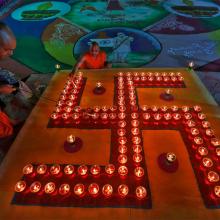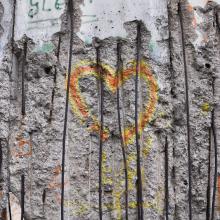Germany
In one weekend, the swastika appeared in public places in three U.S. cities — Houston, Chicago, and New York. The sight was so offensive, average New Yorkers pulled out hand sanitizer and tissues to wipe the graffiti from the walls of the subway where it had been scrawled.
“Within about two minutes, all the Nazi symbolism was gone,” one subway rider who was there said. He added, “Everyone kind of just did their jobs of being decent human beings.”
All was apparently going fine until Micha Brumlik, a retired Frankfurt University education professor and respected Jewish commentator, wrote last June that the popular toy was “anti-Jewish, if not even anti-Semitic.”
The problem, he said, was the inscription on the open pages of the Bible that the Playmobil Luther holds. On the left is written in German: “Books of the Old Testament. END,” while the right page says “The New Testament, translated by Doctor Martin Luther.”
Berlin police urged people to be especially alert Wednesday and warned that the person or persons responsible were likely armed and dangerous. As of Tuesday night, police had received more than 500 tips about the attack. Security has been tightened in Berlin and across other European capital cities.
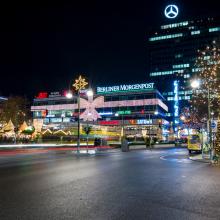
Image via Sergey Kohl/Shutterstock.com
On Dec. 19 a truck drove into a Christmas market in Berlin, Germany, killing at least nine people and injuring more, in what law enforcement officials suspect is a terrorist attack, reports the Guardian. The Christmas market was set up in Breitscheidplatz, one of Berlin’s most-frequented shopping areas.
A police spokesperson announced that the incident may have caused a gas leak. The Christmas market has been evacuated and an information point has been established for people in search of missing loved ones.
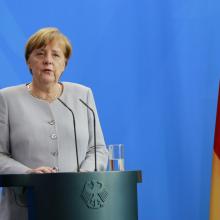
Image via 360b/Shutterstock.com
On Dec. 6 German Chancellor Angela Merkel called for face-covering veils to be banned in Germany, reports the Washington Post.
“The full veil is not appropriate here, it should be forbidden wherever that is legally possible,” said Merkel, speaking to attendees of the Christian Democratic Union's conference.
Tackling a delicate issue, as it begins its yearlong celebration of the Reformation’s 500th anniversary, Germany’s main Protestant church has officially renounced its mission to convert Jews to Christianity.
In practice, the Evangelical Church in Germany (EKD), made up of 20 regional Lutheran, Reformed, and United churches, mostly gave up efforts to convert Jews in the decades after the Holocaust, and closing that chapter should have been a formality.
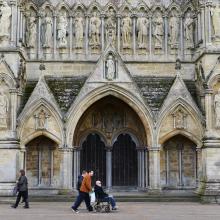
Image via 1000 Words / Shutterstock.com
In late 1945, after the end of World War II, Kurt Neumann began digging in his garden.
During the previous eight years, under the brown soil, a bunch of documents and photos had lain in repose. He scrubbed off the dirt and unspooled the documents from the oil paper preserving wrapped to protect them. He had survived the war and so had the founding papers of the city’s anti-religion, secularist movement.

Reinhold Hanning flanked by lawyers. Image via REUTERS/Bernd Thissen/Pool/RNS
A 94-year-old former SS guard at Auschwitz was convicted in a German court of complicity in the murder of 170,000 people at the Nazi death camp and sentenced to five years in jail, according to media reports.
The verdict in the case against Reinhold Hanning was announced June 17 by the judge presiding over what is likely Germany’s last Holocaust trials, Reuters reported. Hanning, who could have faced a 15-year sentence, will remain free pending any appeals.

Image via REUTERS/Fabrizio Bensch - RTX2533D / RNS
While many countries in Europe have sealed their borders to refugees, Germany has done the opposite. Last year, the country registered over 1 million asylum seekers, including 425,000 from ravaged Syria.
No other country in the European Union has accepted as many. For Syrians and others who risk their lives crossing the Mediterranean Sea in rubber dinghies, Germany has become a beacon of hope.

Cardinal Rainer Maria Woelki. Image via REUTERS/Tony Gentile/RNS
A German Catholic leader’s defense of religious freedom has triggered a backlash following anti-Muslim statements by far-right politicians in the country.
Editor-in-Chief Ingo Brueggenjuergen of the Catholic broadcaster Dom Radio, which ran the interview with Archbishop Rainer Maria Woelki of Cologne earlier this week, said in a commentary April 27 that some critics are claiming the cardinal is out to destroy the Catholic Church.

The Rev. Olivier Ndjimbi-Tshiende. Image via BR24 / Twitter
A Catholic priest has resigned from his parish in Germany after racist threats and abuse by local politicians. The Rev. Olivier Ndjimbi-Tshiende told parishioners during his March 6 sermon that he would be leaving his post in Zorneding, close to Munich, after Easter. The Congolese-German priest received race-related death threats five times in the past few months and has also been stalked, German magazine Der Spiegel reported.

Image via Frank Gaertner/Shutterstock.com
Catholics and Lutherans have made another step toward joint commemoration of the 500th anniversary of the Reformation in 2017 by issuing common liturgical guidelines for ecumenical services to mark the occasion. The guidelines, in a booklet called “Common Prayer,” provide a template for an ecumenical service, complete with suggested prayers, appropriate hymns, and themes for sermons.
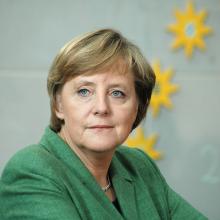
Image via 360b / Shutterstock.com
Time magazine’s 2015 “Person of the Year” is a self-identified conservative Christian, but not one of the many running for president of the United States. While the dynamics of faith and politics are different in Europe, German leader Angela Merkel is an example of a conservative Christian living out her faith in the public square quite differently than we see in the U.S.
Time, which calls her “Chancellor of the Free World,” characterizes her strong leadership of economic and political crises in Europe as “no flair, no flourishes, no charisma, just a survivor’s sharp sense of power and a scientist’s devotion to data.” She may be a quantum chemist, but she’s also an Evangelical Lutheran preacher’s kid with an unwavering faith.

Image via Michaela Rehle / REUTERS / RNS
One of Germany’s largest Protestant regional churches has come under fire from other Christians for speaking out against efforts to convert Muslims just as tens of thousands of refugees from the Islamic world are streaming into the country.
In a new position paper, the Evangelical Church in the Rhineland says the passage in the Gospel of Matthew known as the Great Commission — “Go therefore and make disciples of all nations, baptizing them in the name of the Father and of the Son and of the Holy Spirit” — does not mean Christians must try to convert others to their faith.
“A strategic mission to Islam or meeting Muslims to convert them threatens social peace and contradicts the spirit and mandate of Jesus Christ and is therefore to be firmly rejected,” the paper entitled “Pilgrim Fellowship and Witness in Dialogue with Muslims” argues.

Photo via REUTERS / Wolfgang Rattay/ RNS
A German Catholic diocese wants to take episcopal responsibility to a new level by making its disgraced former “bishop of bling” responsible for the 3.9 million euros ($4.9 million) in losses incurred during the luxury makeover of his residence and office.
Bishop Franz-Peter Tebartz-van Elst earned the “bling” label in 2013 when aides revealed he had spent 31 million euros ($34 million) — over six times the original estimate — on the stately complex opposite the Romanesque cathedral in Limburg, north of Frankfurt.
The Vatican banished him from the diocese several months later and, subsequently, quietly reassigned him to a low-profile post in the Roman Curia. He seemed to be going the way of other failed bishops, such as the few punished in the clerical sexual abuse scandals by being removed from their dioceses
1989 was a big year for me, and for the wider world. It was the year I left my teenage years behind. It was also the year that the brutality of government repression in Tiananmen Square rocked the world, U2 came to my home town and rocked the tennis stadium for seven nights straight, and my football team went back-to-back.
But the biggest news by far that year happened in November when the Berlin Wall came tumbling down literally overnight. For 28 years the wall had separated Berliners from each other, dividing not just a nation but whole systems of government — as well as families, traumatizing them in the process.
This is all very personal for me; I have German parents who grew up during a world war that saw their country devastated both from within and without.
Today marks the 25th anniversary of that most wonderful night when people who had been divided for decades were suddenly reunited, and thousands danced on the symbolic grave of separation, celebrating the death of division. For millions of Germans, it is no doubt one of the enduring memories of their lives. For them, Nov. 9, 1989 will never be forgotten.
I can still recall watching it on TV at my mother’s home. As I was watching, I looked over at Mum and saw tears streaming down her face, unable to believe the enormity of what was happening before her eyes. Talking to my dad later, he said he thought it would never happen in his lifetime.
Some called it “The Great War.” Others called it “The War to End All Wars.” History proves it was neither.
As the world marks the 100th anniversary of the outbreak of World War I — a conflict that left 37 million dead or wounded and reshaped the global map — a number of scholars and authors are examining a facet of the war they say has been overlooked — the religious framework they say led to the conflict, affected its outcome and continues to impact global events today.
More than that, they argue, today’s religious and political realities — ongoing wars, disputed borders and hostile relationships — have their roots in the global conflict that began when Austria-Hungary declared war on Serbia on July 28, 1914.
The Supreme Court on Monday declined to hear an appeal from a family seeking asylum in the United States because home schooling is not allowed in their native Germany.
The case involves Uwe and Hannelore Romeike, Christians who believe German schools would have a bad influence on their six children. The family’s case became a rallying point for many American Christians.
As is their custom, the justices on the high court declined to give a reason for not hearing the case.
Michael Farris, chairman of the Home School Legal Defense Association that represents the family, said the group would pursue legislation in Congress to allow the family to stay. But the Romeikes will likely face deportation.
The $20,000 bathtub and $482,000 walk-in closets ordered by “Bishop Bling-Bling” — the moniker of Franz-Peter Tebartz-van Elst, the now-suspended bishop of Limburg — have scandalized the German public.
But Tebartz-van Elst, 52, is only the latest German clergyman to run into trouble since Pope Francis took the helm of the Roman Catholic Church. Francis temporarily suspended the bishop on Wednesday while a church commission investigates the expenditures on the $42 million residence complex.
As the new pontiff tries to reform the way the church does business, German dioceses, which reportedly include the world’s wealthiest in Cologne, are chafing under the new direction as membership numbers continue to dwindle.
Deep with one savior’s death, how many more?
In observance of which, the Dresden burghers
as usual held Shrove Tuesday circuses
around Our Lady’s Church, the Frauenkirche,
eating pancakes before their fast for Easter.
